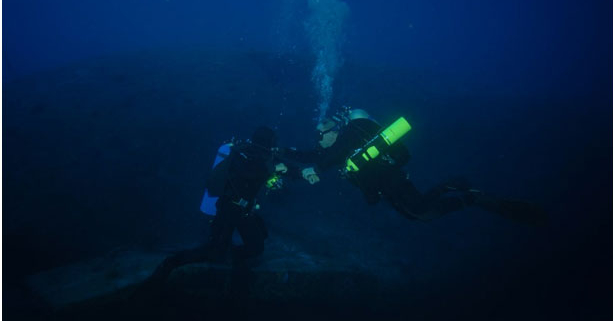Never Get Lost on a Night Dive or “I’m Pretty Sure I Know Where I Am….”
You know some of my best dives over the years have been night diving and while some of the coolest critters are out at night or readily seen “napping,” one of the more enjoyable aspects for me was the darkness. It just seemed to be quieter and more peaceful, although in reality, everything that was happening during daylight was still going on at night – plus a whole lot more!
On the other hand, it is quite normal not to have those comfortable feelings when entering the water at night, and to approach a night dive with a little well-placed apprehension and caution. That’s perfectly normal. When the ambient light is gone, certainly one may have thoughts of losing situational awareness – how will I navigate underwater or return to my starting point? After all, we don’t want to get lost.
There are a number of precautions and actions that we can take to prevent getting lost and to minimize or eliminate any dangers of a night dive. Let’s look at some of these:
- Planning a night dive. Planning should occur for every dive we make and it becomes even more important for a night dive. With your dive buddy, decide on the location, consider environmental, such as tides, currents and entry point, and also ask yourselves “Is the dive site appropriate for a night dive?” In addition, review any light signals that you are likely to use to avoid any confusion about the signals. Decide on what your activities will be and finally ask “Am I ready for a night dive?”
- Once planned, give this dive plan to somebody staying who is onshore or on the boat, just in case things do not go according to plan.
- • How are your underwater navigation skills? Make certain your compass is positioned correctly for use, whether analog or electronic, and that you are familiar with it. If starting from shore, make note of the direction that the shore runs…say southeast to northwest for example…and also which point on the compass is the water. If you’re standing on the beach with the water in front of you and the compass is showing a heading of 100°, then returning to shore will be 280°. One of the best methods of becoming comfortable with compass use is to enroll in an Underwater Navigation course. Along with increased skill levels, you’ll also learn to trust your navigation instruments. We should also make note of the natural surroundings that often reveal direction.
- Do you have night diving equipment? Besides the standard open water equipment in your kit, a good primary underwater light will be necessary. If the light includes a rechargeable battery, make sure it is charged. If you’re using replaceable batteries, have fresh ones installed. In addition, having a smaller backup is an excellent idea to ensure that in the event your primary fails, you’ll have a light to monitor your instruments in order to end the dive. In addition, consider having a small battery operated strobe light attached somewhere on you or your equipment. This will assist your dive buddy in knowing exactly where each of you is at any time. Also consider placing a strobe on the anchor line or float line to assist in identifying where your exit is. If not a small strobe, consider one of the battery operated LED Glow Sticks.
- As we mentioned lights, if you are conducting a shore dive at night, placing two lights in alignment onshore will assist you in determining the exit point when you surface. One light, in the back, should be slightly higher than the front light. Observing that the front light is left or right of the rear light will indicate which direction to proceed to exit.
- If you are night diving from a boat, check with the boat crew to determine any special rules the boat may have for night diving. Make note of any lighting system the boat has to assist you in identifying the right boat.
Using common sense and diving within your training and abilities will go a long way to keep you from getting lost while night diving. To have an even more enjoyable experience, consider visiting your local SDI dive center and enrolling in an SDI Night Diver course. It’s a lot of fun, it will provide for new experiences and it will teach you valuable night diving skills.
For more information about night diving or to locate an SDI dive center in your region, call 888.778.9073.
Contact SDI TDI and ERDI
If you would like more information, please contact:
Tel: 888.778.9073 | 207.729.4201
Email: Worldhq@tdisdi.com
Web: https://www.tdisdi.com
Facebook: www.facebook.com/SDITDI



发表评论
想加入讨论吗?请发表您宝贵的意见!